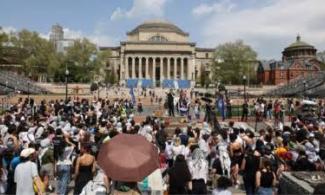
It was learnt that the police removed a protest encampment the Ivy League school had sought to dismantle for nearly two weeks.
Scores of pro-Palestinian demonstrators holed-up in an academic building on Columbia University campus late on Tuesday have been arrested by New York City Police.
It was learnt that the police removed a protest encampment the Ivy League school had sought to dismantle for nearly two weeks.
The Columbia University President, Minouche Shafik, shortly after police moved in, released a letter in which she requested police stay on campus until at least May 17, two days after graduation "to maintain order and ensure that encampments are not re-established."
Reuters reports that within three hours the campus had been cleared of protesters, said a police spokesperson, adding "dozens" of arrests were made.
The throngs of helmeted police marched onto the elite campus in upper Manhattan at the start of the police operation around 9 p.m. ET, a focal point of student rallies that have spread to dozens of schools across the U.S. in recent days expressing opposition to Israel's war in Gaza.
"We're clearing it out," the police officers yelled. Soon after, a long line of officers climbed into Hamilton Hall, an academic building that protesters had broken into and occupied in the early morning hours of Tuesday.
Police entered through a second-story window, using a police vehicle equipped with a ladder.
According to the report, police were seen loading dozens of detainees onto a bus, each with their hands bound behind their backs by zip-ties, the entire scene illuminated with flashing red and blue lights of police vehicles.
"Free, free, free Palestine," chanted protesters outside the building. Others yelled "Let the students go."
“Columbia will be proud of these students in five years,” said Sueda Polat, one of the student negotiators for Columbia University Apartheid Divest, the coalition of student groups that has organised the protests.
She said students did not pose a danger and called on police to back down, speaking as officers shouted at her and others to retreat or leave campus.
Protesters were seeking three demands from Columbia: divestment from companies supporting Israel's government, greater transparency in university finances, and amnesty for students and faculty disciplined over the protests.
President Shafik this week said Columbia would not divest from finances in Israel. Instead, she offered to invest in health and education in Gaza and make Columbia's direct investment holdings more transparent.
In her letter released on Tuesday, Shafik said the Hamilton Hall occupiers had vandalized University property and were trespassing, and that encampment protesters were suspended for trespassing. The university earlier warned that students taking part in the Hamilton Hall occupation faced academic expulsion.
The occupation began overnight when protesters broke windows, stormed inside and unfurled a banner reading "Hind's Hall," saying they were renaming the building for a 6-year-old Palestinian child killed in Gaza by the Israeli military.
The eight-story, neo-classical building has been the site of various student occupations dating back to the 1960s.
At an evening news briefing held a few hours before police entered Columbia, Mayor Eric Adams and city police officials said the Hamilton Hall takeover was instigated by "outside agitators" who lack any affiliation with Columbia and are known to law enforcement for provoking lawlessness.
Police said they based their conclusions in part on escalating tactics in the occupation, including vandalism, use of barricades to block entrances and destruction of security cameras.
One of the student leaders of the protest, Mahmoud Khalil, a Palestinian scholar attending Columbia's School of International and Public Affairs, disputed assertions that outsiders led the occupation.
"Disruptions on campus have created a threatening environment for many of our Jewish students and faculty and a noisy distraction that interferes with the teaching, learning and preparing for final exams," the university said in a statement on Tuesday before police moved in.